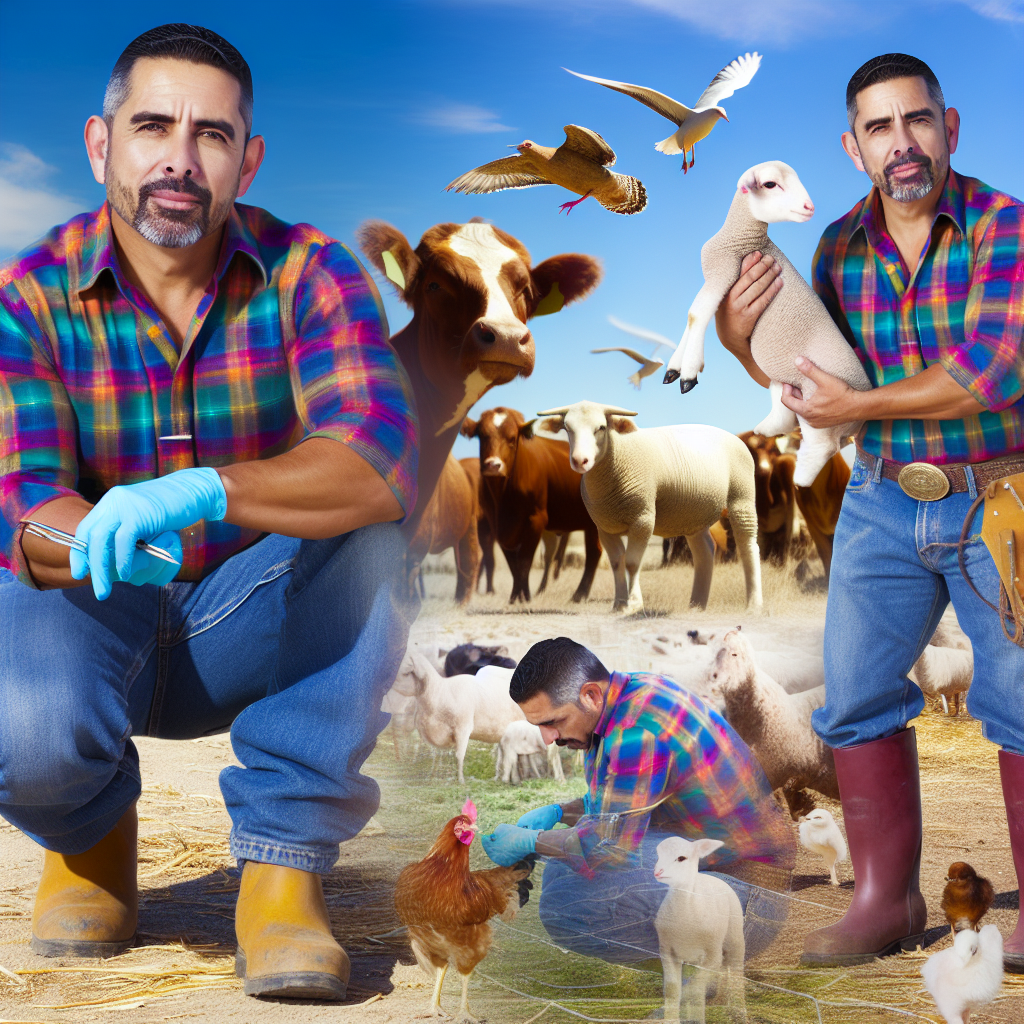Understanding Exotic Livestock
Definition of Exotic Livestock
Exotic livestock refers to species not native to a specific region.
These animals often differ significantly from traditional livestock.
Farmers raise them for various purposes, including meat, fur, or companionship.
Examples include alpacas, llamas, and miniature goats.
Each species brings unique traits and characteristics.
Characteristics of Exotic Livestock
Exotic livestock possess several defining characteristics.
First, they typically require specialized care and handling.
This care includes specific diets and habitat conditions.
Second, many exotic species have unique social structures.
Understanding these dynamics is crucial for successful management.
Benefits of Raising Exotic Livestock
Raising exotic livestock offers various benefits.
These animals can diversify farm income through niche markets.
Additionally, they enhance biodiversity on agricultural lands.
Many exotic species are hardy and adapt well to different climates.
This adaptability can lower overall production risks.
Transform Your Agribusiness
Unlock your farm's potential with expert advice tailored to your needs. Get actionable steps that drive real results.
Get StartedChallenges in Managing Exotic Livestock
Despite the benefits, managing exotic livestock poses challenges.
First, they often require specialized veterinary care.
Second, securing proper feed and resources can be difficult.
Additionally, exotic livestock may face different health issues compared to traditional breeds.
These challenges necessitate careful planning and expertise.
Regulatory Challenges in Exotic Livestock Ownership and Management
Understanding Regulatory Frameworks
Exotic livestock ownership faces complex regulatory frameworks.
These regulations vary significantly by region.
They can include import permits, health certifications, and zoning laws.
Compliance with these requirements poses a challenge for owners.
Moreover, understanding local, state, and federal regulations can be difficult.
Navigating Permitting Processes
Obtaining the necessary permits is often a lengthy process.
One must provide detailed information about the species being kept.
Additionally, owners are required to prove they can meet animal welfare standards.
Failure to navigate this process correctly can result in hefty fines.
Health and Safety Regulations
Health regulations are crucial in exotic livestock management.
Owners must ensure their animals are disease-free and well-cared for.
Regular health inspections are often mandated by authorities.
These inspections can disrupt daily operations for farm owners.
It is essential to stay informed about emerging health risks.
Impact of Animal Welfare Laws
Animal welfare laws are becoming more prevalent across jurisdictions.
These laws dictate how exotic animals should be housed and cared for.
Violating these laws can lead to legal repercussions and loss of livestock.
Owners must educate themselves on humane farming practices.
Dealing with Zoning and Land Use Regulations
Zoning regulations often restrict the types of livestock one can own.
Showcase Your Farming Business
Publish your professional farming services profile on our blog for a one-time fee of $200 and reach a dedicated audience of farmers and agribusiness owners.
Publish Your ProfileMany urban and suburban areas have strict rules against exotic animals.
Property owners may face challenges when trying to comply with these regulations.
Understanding local zoning codes is critical for successful management.
Responding to Changes in Legislation
Legislative changes can create uncertainty for exotic livestock owners.
New laws might impose additional requirements or restrictions.
Staying updated on legislative developments is vital for compliance.
Participation in local agricultural groups can help owners stay informed.
Feeding and Nutritional Requirements of Exotic Species
Understanding Nutritional Needs
Exotic species require specific nutrients for optimal health.
Each species has unique dietary preferences and needs.
Identifying these needs is critical for effective feeding strategies.
Types of Nutrients
Animals benefit from a balanced diet comprising essential nutrients.
These nutrients include proteins, carbohydrates, fats, vitamins, and minerals.
An adequate protein source is vital for growth and reproduction.
Carbohydrates provide energy for daily activities.
Fats support cell function and hormone production.
Vitamins and minerals contribute to overall health and immune function.
Feeding Practices for Exotic Species
Proper feeding practices ensure nutritional requirements are met.
Consulting with a veterinarian or nutritionist helps create a balanced diet.
Implementing diverse feeding strategies can prevent dietary deficiencies.
Addressing Common Dietary Issues
Exotic animals may face challenges related to nutrition.
Overfeeding can lead to obesity and related health problems.
Conversely, underfeeding can cause malnutrition and weakness.
Regular assessments of body condition help manage these issues.
Supplementation and Special Diets
Some exotic species may require dietary supplements.
These supplements can enhance their overall health and well-being.
Special diets may be needed for specific health conditions or life stages.
Consulting with professionals is crucial for proper supplementation.
Monitoring and Adjusting Diet
Ongoing evaluation of feeding practices is essential.
Adjustments may be necessary based on health status and seasonal changes.
Monitoring weight and behavior can guide dietary modifications.
Maintaining good records helps track dietary changes over time.
You Might Also Like: Energy-Efficient Solutions for Sustainable Aquaculture
Health Management in Exotic Livestock
Overview of Common Diseases
Exotic livestock can suffer from various diseases.
Understanding these diseases is essential for effective management.
Some common diseases include parasites, respiratory infections, and viral illnesses.
For instance, Camelids are susceptible to parasitic infections such as strongylids.
Additionally, birds can face respiratory issues caused by mycoplasma.
Recognizing symptoms early leads to better outcomes for the animals.
Preventive Care Strategies
Preventive care is vital for the health of exotic livestock.
Routine vaccinations help protect against many diseases.
Showcase Your Farming Business
Publish your professional farming services profile on our blog for a one-time fee of $200 and reach a dedicated audience of farmers and agribusiness owners.
Publish Your ProfileConsultation with a veterinarian ensures proper vaccination protocols.
Regular health check-ups identify health issues early.
Providing nutritious diets boosts the immune systems of these animals.
Good hygiene practices minimize disease risks.
Creating a Health Management Plan
Developing an effective health management plan is crucial.
Begin by assessing the risks specific to the species you manage.
Include vaccination schedules and parasite control measures.
Establish biosecurity protocols to prevent disease introduction.
Incorporate regular monitoring for signs of illness.
This proactive approach helps ensure the overall well-being of your livestock.
Collaboration with Professionals
Working with veterinary professionals enhances health management.
They provide valuable insights into disease prevention and control.
Veterinarians can guide proper care and treatment protocols.
Establishing strong relationships with local experts pays off in better animal health.
Participating in education programs keeps you updated on best practices.
Implementing Monitoring Systems
Establishing monitoring systems tracks health and productivity.
Recording health records helps identify trends and issues.
Technology can streamline data collection and analysis.
Utilizing health monitoring software simplifies reporting and assessment.
Regular evaluation of health metrics leads to improved management strategies.
Learn More: Technology Innovations in Livestock Transportation
Habitat and Space Requirements for Exotic Livestock
Assessing Species-Specific Needs
Different species of exotic livestock have unique habitat requirements.
Understanding these needs is crucial for their health and welfare.
For instance, reptiles often require specialized temperature controls.
Meanwhile, exotic birds thrive in spacious aviaries for flight.
Therefore, identifying the species’ specific requirements is essential.
Designing Appropriate Environments
Space is a critical factor in exotic livestock management.
Many animals need adequate room to roam and express natural behaviors.
Designing habitats that resemble their native environments is beneficial.
This may involve creating varied terrain and shelter options.
Additionally, access to clean water and food sources is essential.
Environmental Enrichment
Providing enrichment is vital for the mental well-being of exotic livestock.
Enrichment can come in many forms, including toys and natural elements.
For example, branches or logs can encourage climbing and exploration.
Furthermore, rotating enrichment items prevents boredom.
This strategy fosters active and engaging habitats.
Safety and Security Considerations
Safety is paramount when managing exotic livestock habitats.
Secure fencing keeps animals safe from predators and escapes.
Moreover, proper ventilation prevents respiratory issues in confined spaces.
Regular inspections of habitats ensure they remain safe and functional.
Showcase Your Farming Business
Publish your professional farming services profile on our blog for a one-time fee of $200 and reach a dedicated audience of farmers and agribusiness owners.
Publish Your ProfileLastly, create safe access points for caregivers to perform necessary care.
Adapting to Climatic Conditions
Different regions present varying climatic challenges for exotic livestock.
Outdoor habitats must accommodate extreme weather conditions.
Shade and shelter protect animals from heat stress in warmer climates.
Conversely, heating elements may be necessary in colder climates.
Continuous monitoring of temperatures ensures livestock comfort and safety.
Learn More: Selecting the Best Routes for Livestock Transport

Breeding Management: Challenges and Best Practices for Exotic Species
Understanding Breeding Challenges
Breeding exotic livestock presents unique challenges.
Genetic diversity is often limited in captive populations.
This can lead to inbreeding and associated health issues.
Moreover, identifying suitable breeding pairs can be difficult.
Seasonal breeding patterns add complexity to management.
In some species, synchronization of heat cycles is critical.
Challenges related to nutrition can affect reproductive success.
Best Practices for Breeding Management
Implementing best practices promotes successful breeding programs.
Establish comprehensive breeding records for each animal.
This approach helps monitor lineage and genetic diversity.
Conduct regular health assessments of breeding stock.
Healthy animals enhance the odds of successful breeding.
Use assisted reproductive technologies when appropriate.
Techniques like artificial insemination can widen genetic diversity.
Moreover, maintain a controlled breeding environment.
This ensures that animals experience minimal stress.
Nutritional Considerations
Nutrition plays a vital role in breeding success.
Develop specialized diets tailored to specific species needs.
Consider seasonal changes in dietary requirements.
Monitor body condition scores to identify nutritional gaps.
Supplement diets with necessary vitamins and minerals.
This supports optimal reproductive health in breeding animals.
Environmental Factors
The breeding environment significantly impacts outcomes.
Maintain suitable habitats that mimic natural conditions.
Ensure proper temperature and humidity levels are maintained.
Provide enrichment to reduce stress and encourage natural behaviors.
Awareness of seasonal variations aids in planning breeding efforts.
Monitoring and Evaluation
Continuous monitoring is crucial for effective breeding management.
Regularly evaluate the health and performance of offspring.
Collect data on breeding outcomes for analysis.
This information informs future breeding decisions.
Adjust management strategies based on observed results.
Engage with veterinarians or reproduction specialists for guidance.
Showcase Your Farming Business
Publish your professional farming services profile on our blog for a one-time fee of $200 and reach a dedicated audience of farmers and agribusiness owners.
Publish Your ProfileConsultations help refine breeding practices and address issues.
Explore Further: Innovative Technologies Transforming Modern Aquaculture
Market Access and Economic Viability of Exotic Livestock Farming
Understanding Market Demand
Market demand shapes the economic viability of exotic livestock farming.
Producers must understand consumer preferences for exotic meats and products.
Research shows that niche markets often yield higher prices.
Farmers can benefit from attending trade shows and specialty markets.
Building relationships with local chefs and specialty shops can increase sales.
Regulatory Challenges
Exotic livestock farmers face numerous regulatory challenges.
Compliance with local, state, and federal laws can be daunting.
Licensing and zoning laws vary by location and species.
Farmers must navigate permits for breeding and selling exotic animals.
Moreover, biosecurity regulations affect how farms operate.
Logistics and Distribution
Effective logistics are crucial for success in exotic livestock farming.
Farmers need reliable transportation to deliver products efficiently.
Access to cold storage facilities is essential for perishable goods.
Partnerships with distributors can expand market reach.
Additionally, online sales platforms offer alternative distribution channels.
Financial Considerations
Financial planning is vital for exotic livestock operations.
Farmers should conduct thorough market research to estimate profits.
Initial investment costs can be substantial, influencing financial viability.
Farmers may explore loans or grants specific to innovative farming practices.
Insurance is also a necessary expense to safeguard investments.
Consumer Education
Educating consumers can enhance market access for exotic products.
Farmers can host farm tours and tastings to promote their offerings.
Social media serves as a powerful tool for consumer engagement.
Promoting the health benefits and sustainability of exotic meats is vital.
Collaboration with nutritionists and food bloggers can amplify awareness.
Ethical Considerations and Animal Welfare in Exotic Livestock Management
Understanding Animal Welfare
Animal welfare focuses on the well-being of livestock.
It encompasses the physical and psychological aspects of their lives.
Farmers must ensure that exotic species have proper living conditions.
Good housing grants protection from harsh weather and predators.
Additionally, adequate space to roam and engage in natural behaviors is crucial.
Ensuring Ethical Treatment
Ethical treatment is a critical component of livestock management.
Farmers need to prioritize humane handling practices.
This includes minimizing stress during transport and husbandry activities.
Using low-stress handling techniques promotes animal trust and safety.
Also, staff training is essential in upholding ethical standards.
Understanding Species-Specific Needs
Each exotic species has unique requirements for care.
Understanding these needs is vital to their welfare.
For example, some species thrive in social groups, while others prefer solitude.
Showcase Your Farming Business
Publish your professional farming services profile on our blog for a one-time fee of $200 and reach a dedicated audience of farmers and agribusiness owners.
Publish Your ProfileProviding appropriate companionship influences their mental health positively.
Furthermore, dietary needs vary significantly among species.
Regulatory Compliance and Ethical Practices
Compliance with regulations ensures ethical livestock management.
Farmers must stay updated on local and international laws.
This includes guidelines for health, safety, and animal welfare.
Employing ethical practices can enhance farm reputation.
Moreover, consumer awareness of animal welfare trends is increasing.
The Importance of Continuous Education
Continuous education is essential for exotic livestock management.
Farmers should seek knowledge about animal behavior and welfare standards.
Workshops and webinars can be valuable resources for learning.
Moreover, connecting with experts fosters deeper understanding.
Education promotes best practices and compliance.




